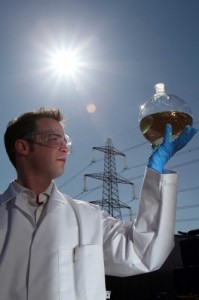Engineers produce fuel – from the air
 It sounded like a dream that could not come true – a price-stable, carbon neutral, almost infinitely available replacement for aviation and motor fuel.
It sounded like a dream that could not come true – a price-stable, carbon neutral, almost infinitely available replacement for aviation and motor fuel.
And then a small company announced that its engineers had made it happen Ð and had succeeded in creating petrol using just water, electricity and air.
AFS readily admits that for some people, reading some of the more lurid reports, the process seems just too good to be real.
“In fact, of course, we are serious scientists, engineers and business people at AFS, our sound engineering processes have been supported by the Institution of Mechanical Engineers and we have a solid business proposition,” said a spokesperson.
And plans for exciting business developments are under way. Thanks to its successful demonstrator programme, AFS is now ready to build a commercial plant capable of producing levels of one tonne a day – perhaps specialist fuels for top-end motorsport applications, initially.
The Institution of Mechanical Engineers (IMechE) has recognised that the AFS approach is a great example of pioneering UK innovation in green, clean technology.
Dr Tim Fox, head of energy and environment at IMechE, said: “Air capture technology ultimately has the potential to become a game-changer in our quest to avoid dangerous climate change.
“What was just a smart idea in the minds of a handful of academics a few years ago is now a proven, engineered method for removing carbon dioxide (CO2) from the atmosphere and making a useful product.
“The beauty of petrol from air is that you are effectively recycling CO2 and avoiding further transport emissions.”
The business potential was also recognised during a recent Cleantech Investor Future Transport Challenge event. A panel of investors that included Dr Dominic Emery, chief development officer for BP Alternative Energy, and Andreas Schamel, Ford’s chief engineer for powertrain research and advanced engineering, Europe, found that AFS was a clear winner.
The panel members enquired about the building of commercial plants and how the price of fossil oil affects the AFS carbon-neutral synthetic alternative.
The gap between the United States use of 26 barrels of oil per person per year and China’s three barrels is expected to close rapidly over the next five years as China’s standard of living increases. Therefore, uncertainty about future availability will place a great strain on oil availability and price.
Independent engineering analysis conducted for AFS shows that a one-tonne a day production plant taking carbon from a point source such as a brewery, distillery or aerobic digester – that can be built within 18-24 months of funding – can be competitive with equivalent, specialist fossil fuels and commercially viable.
People have questioned how much energy the process uses.
Air Fuel Synthesis explains that, as with any technology, there is always a loss in any energy conversion.
For example, coal-fired power stations are only 30 per cent efficient. But at AFS, energy efficiency is better than that and will continue to improve with larger plants and, of course, does not contribute to carbon-induced global warming.
Using renewable energy, such as wind or solar power, the AFS process captures CO2 and water from the air, electrolyses the water to make hydrogen and reacts the CO2 and hydrogen together to make hydrocarbon fuels.
This clean fuel is a direct drop-in replacement fuel for existing vehicles and infrastructure.
It can also be used to store intermittent ‘wrong time’ or stranded ‘wrong place’ energy from renewable sources and has many advantages over bio-fuels when blended with conventional petrol, a feature that has already attracted the attention of the motorsport industry.



